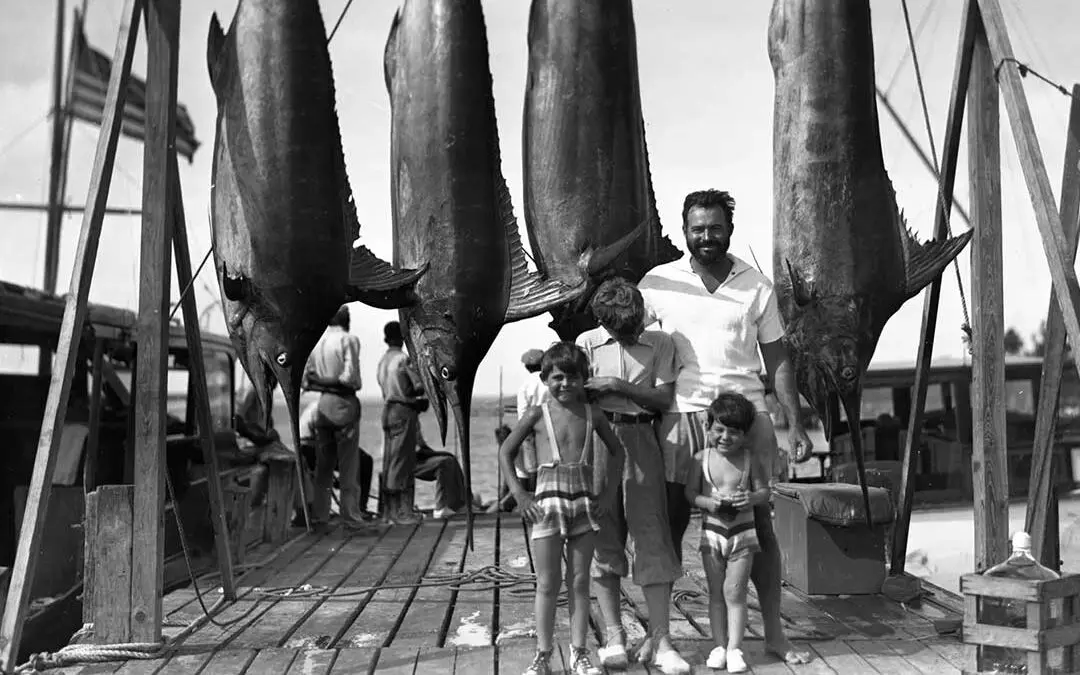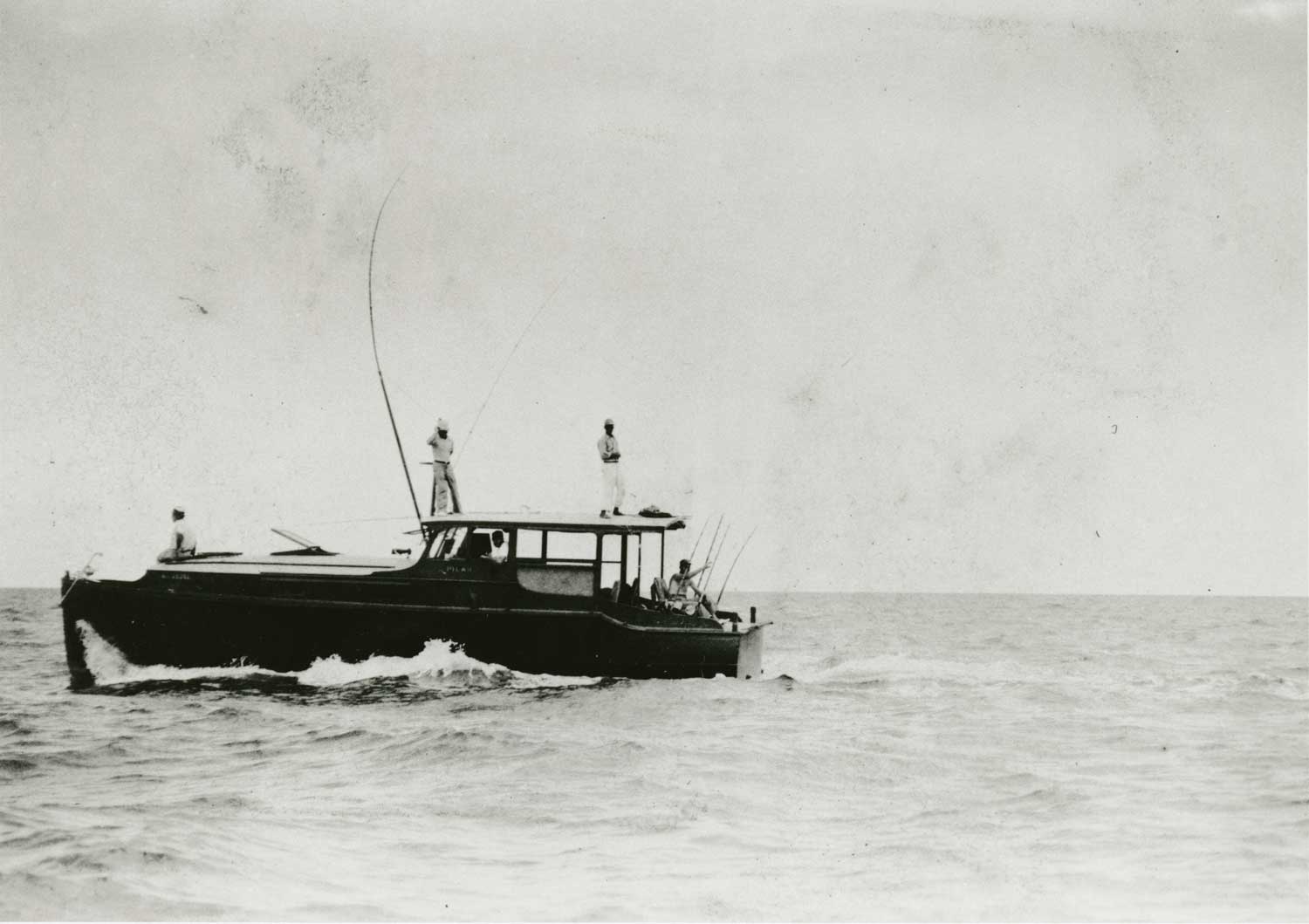
The Pilar was Ernest Hemingway’s boat, a 38-foot Wheeler Playmate. I was trying to catch up to her, but she was faster by six knots and had a head start of about 50 years. Custom built, she held ice, water, and fuel for 350 miles. Two engines of different sizes, the smaller one for trolling. Both throttles against the stops, she could make 16 knots on a flat sea. Papa borrowed money from in-laws and editors to buy it.
Can’t tell you why I give a damn about Hemingway; can’t tell you why you should either, except he was a hero in three wars and won the Nobel Prize and defined journalism as we know it. You read The Perfect Storm? You read Into the Wild and yes, even Bury My Heart at Wounded Knee? You read Hemingway.
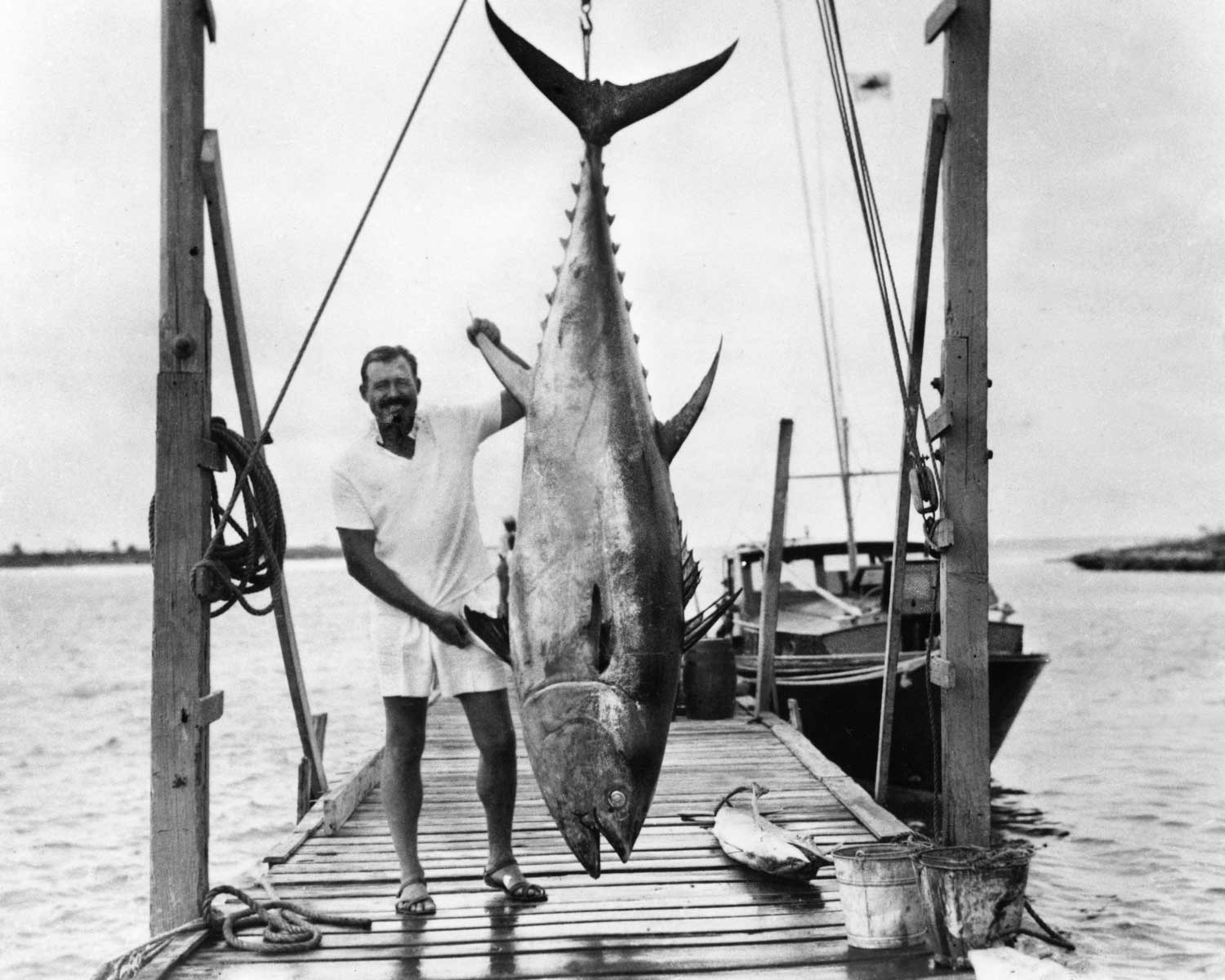
Hemingway on a Bimini fishing pier with one of his biggest ever bluefin tunas.
He was a bully and a monumental pain in the ass. He loved children and whores, but he cold-cocked a Pulitzer poet and machine-gunned the plumbing in the Paris Ritz. He embittered three, maybe four, otherwise perfectly good women and then he shot himself, and I never have quite forgiven him for that.
But back to the business at hand, when there was scant time for literary consideration. I was aboard Maggie C, a 26-foot Maine Lobsterman rigged for ocean-running and fixing to run aground on the Bimini reef. Two power poles looked too much like channel markers. Bahamians harbor a genial ambivalence toward just about everything, their aids to navigation near the top of the list. In the subsequent 600 miles of island bumping, I saw neither beacon nor buoy where it was supposed to be.
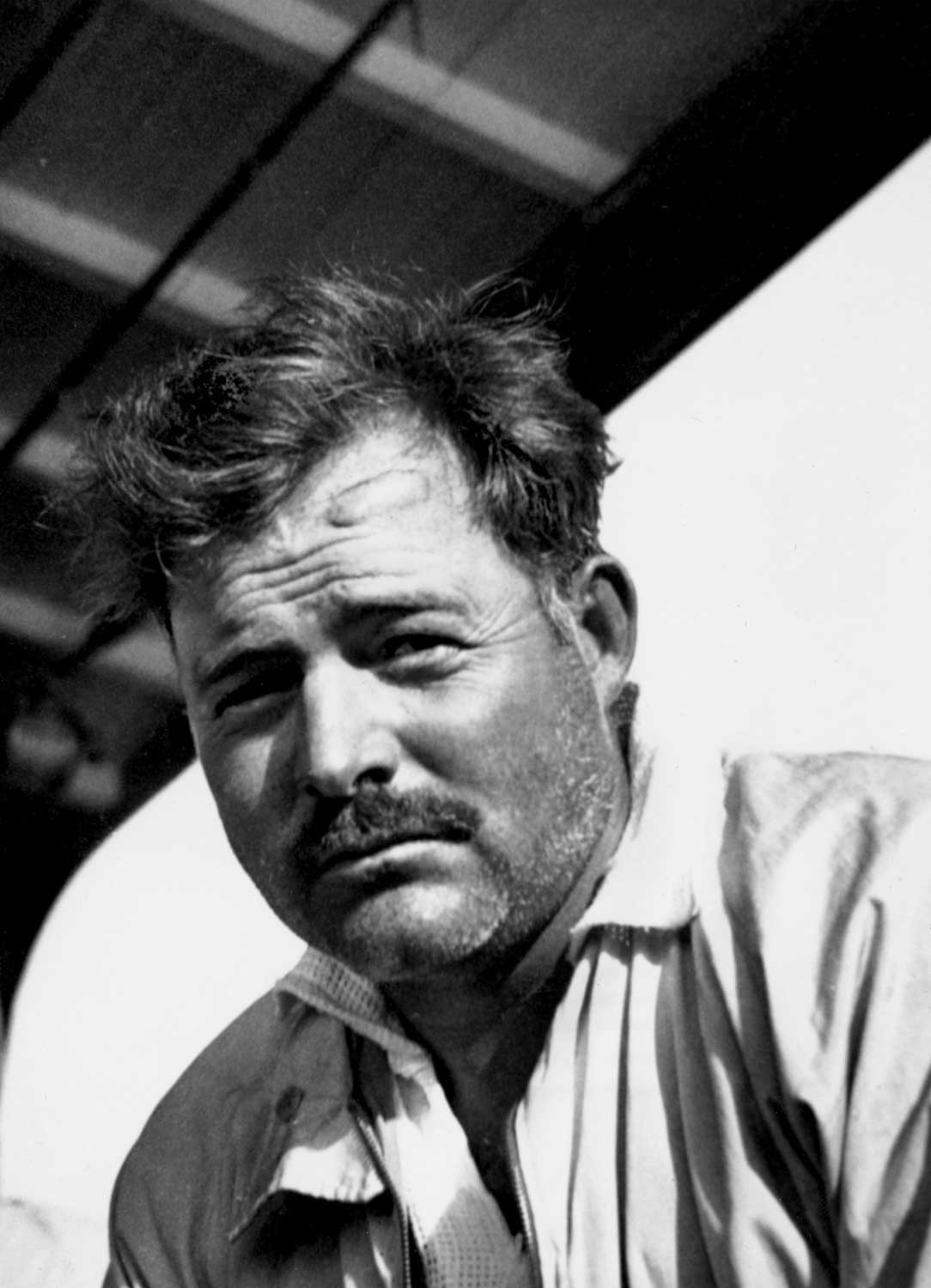
Photo: John F. Kennedy Library
Hard aport, then hard to starboard, oh Sweet Jesus, coral to tear the bottom out of a boat. But we made it to Weech’s Marina in Alice Town, Bimini. We ran up the yellow quarantine flag, and Morris Bowleg padded barefoot down the dock to welcome us to his sovereign nation. Did we want to fish? That was ten dollars per reel. Did we have firearms aboard? Oh yes we did, a revolver, an automatic, and a pump shotgun stuffed with double-ought buck, as there were narco-pirates about. Do you have ammunition for the declared firearms? We made up a number that suited him.
“When you leave,” Bowleg cautioned, “you must stop again and give an account of your ammunition.” We promised we would and knew we would not.
We pulled down the quarantine flag and ran up the Bahamian courtesy pennant.
American author John dos Pasos was along on Pilar’s maiden voyage. “There was a wharf and some native shacks,” he wrote, “under the coconut palms and some kind of store with a back room where we drank rum in the evenings.”
Hemingway elaborated, “a pretty good hotel, the Compleat Angler where we slept when it was too wet to sleep on the roof of the boat.”
The wharf was Weech’s and the Compleat Angler was just up the hill, where they gave you the rum, but charged for the tonic. Limes and lemons were extra but free if you picked them in the yard and brought them inside. Ditto bananas for breakfast. The Gulf Stream provokes powerful thirst, then and now. We wobbled on our sea-legs toward sweet relief.

On his 1985 trip to Bimini, Roger Pinckney photographed all of the 18 or so pictures of Hemingway on display in The Compleat Angler, a hotel and bar that was destroyed by fire in 2006.
There was an alcove off the barroom, maybe 10 by 20 square, or mostly square. There were bright, sunny windows overlooking the sea. There was a model of the Pilar in a glass case, newspaper clippings and such. But then there were a dozen, maybe 18, black-and-white prints yellowing in the cheapest frames. Hemingway drunk and sober; Hemingway with fish and without; Hemingway smirking after whipping hell out of Bimini’s best prizefighter on Weech’s dock. I left my rum on the bar, Gosling’s Black Seal and tonic. I careened to the boat and came back with my Pentax. And I got pictures of the pictures.
“Mr. Pinckney, some of these pictures have never been seen before.” That was the call from Alan Goodrich, curator of the Hemingway collection at the John F. Kennedy Library, the world’s most extensive. I sent them prints, not the negatives.
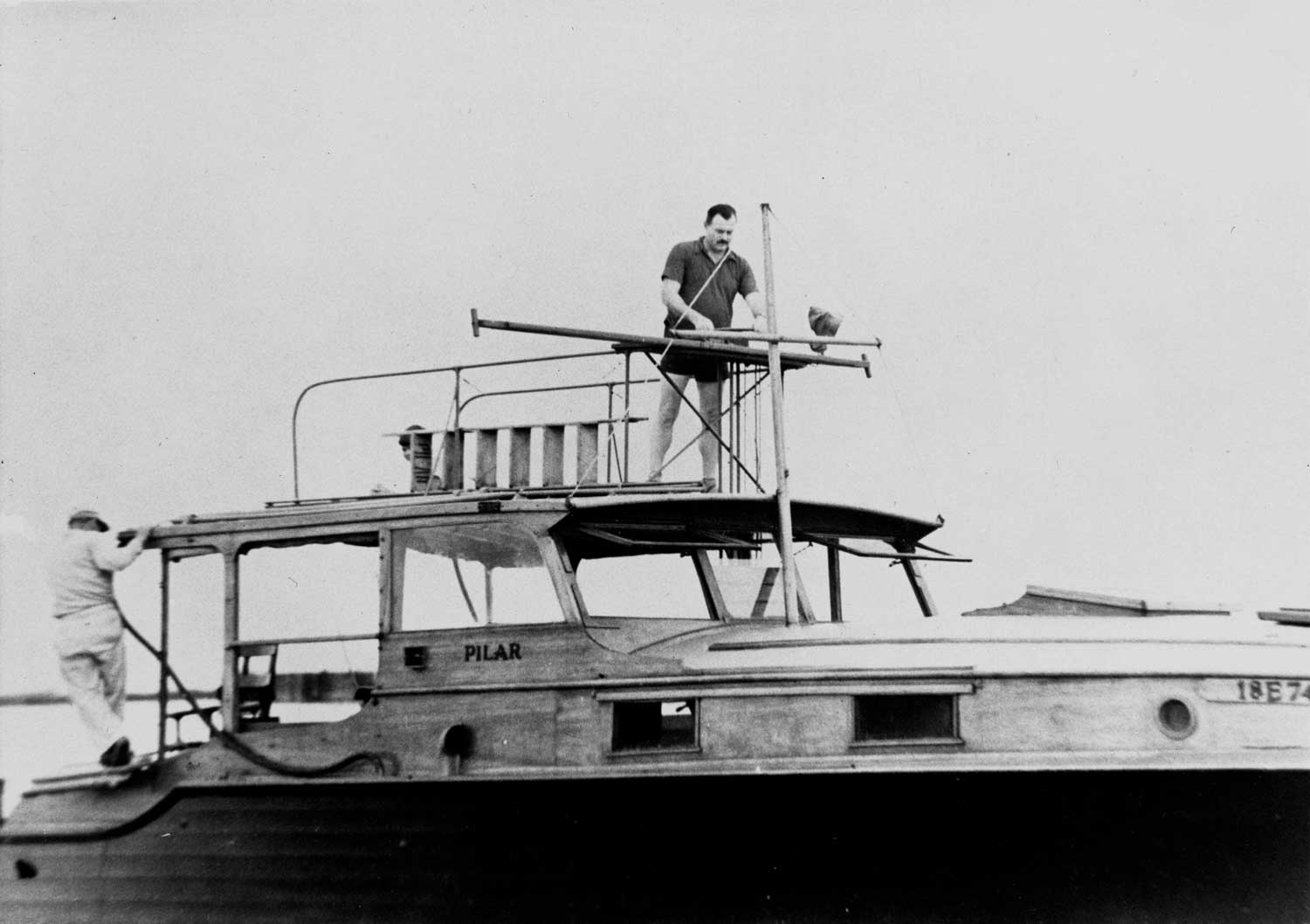
Photo: John F. Kennedy Library
“We would be very interested in sending our technicians to Bimini. We would set the prints up on an easel, photograph them with a high-resolution camera, then remount the originals with acid-free paper behind UV-proof glass at no charge to them. These photos would be good for the next hundred years. Could you arrange an introduction?”
I did but that was as far as it went. “No mon, dey cannot tamper with the photos, mon.”
Thus at impasse, we turned to Plan B. Would I be willing to violate the embargo, fly to Havana via Nassau, and establish a relationship between the JFK and the Cuban museum at La Finca Vigia, the “View Farm” where Hemingway fished, drank, whored, and wrote The Old Man and the Sea? The memorabilia there was in critical condition, including Pilar, dry-rotting to nothing. Why hell yes! Buy me the airfare, a hotel room, and a modest per diem.
Long pause. “I am very sorry, Mr. Pinckney, we can’t do that. If we pay you to break the law, we would lose our non-profit status.”
“Wait a minute. You are asking me to break the law on your behalf, but you won’t pay me for it?”
“That’s right.”
On Jan 13, 2006, The Compleat Angler burned to the ground, taking the life of the proprietor, who perished while leading guests to safety.
All the photos were lost. But I still have pictures of the pictures.
Editor’s Note: this article originally appeared in the “Fishing the World” 2015 issue of Sporting Classics
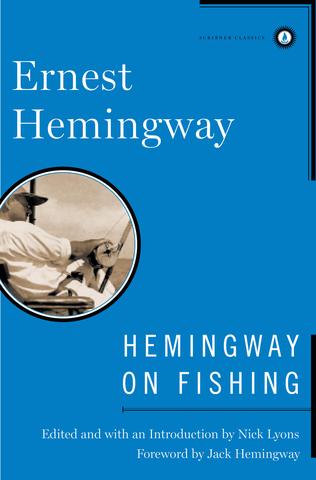 Hemingway on Fishing is an encompassing, diverse, and fascinating assemblage. From the early Nick Adams stories and the memorable chapters on fishing the Irati River in The Sun Also Rises to such late novels as Islands in the Stream, this collection traces the evolution of a great writer’s passion, the range of his interests, and the sure use he made of fishing, transforming it into the stuff of great literature.
Hemingway on Fishing is an encompassing, diverse, and fascinating assemblage. From the early Nick Adams stories and the memorable chapters on fishing the Irati River in The Sun Also Rises to such late novels as Islands in the Stream, this collection traces the evolution of a great writer’s passion, the range of his interests, and the sure use he made of fishing, transforming it into the stuff of great literature.
Anglers and lovers of great writing alike will welcome this important collection. Buy Now

